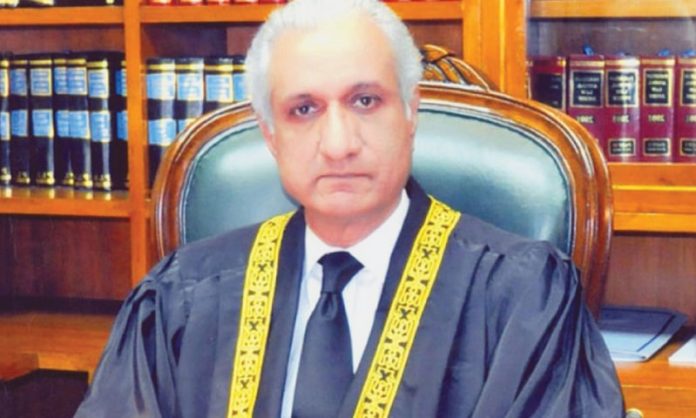Ahsan would have become the chief justice, the highest judicial office in the country that comes with supreme power — after CJP Isa’s term concluded in October this year
Khayyam Abbasi
Islamabad: In a shocking development, Supreme Court Justice Ijazul Ahsan on Thursday resigned from his position, a day after Justice Mazahar Ali Akbar Naqvi did the same.
Justice Ahsan was slated to be the next chief justice of Pakistan (CJP) after CJP Qazi Faez Isa.
According to the resignation addressed to the president, Justice Ahsan said: “I no longer wish to continue as a judge of the Supreme Court of Pakistan.”
He said he resigned as per Article 206(1) of the Constitution with immediate effect. The letter did not mention a reason for the resignation.
President Dr Arif Alvi earlier today accepted Justice Naqvi’s resignation after the judge, who is facing complaints of misconduct, tendered his resignation as a judge of the Supreme Court a day ago.
Naqvi was facing a Supreme Judicial Council (SJC) inquiry over allegations of misconduct, a show-cause notice for which was issued in October last year. On Tuesday, the apex court had rejected his request to stay the proceedings.
Justice Ahsan — part of the five-member SJC — had refused to join other members of the council on Nov 22, 2023, in the issuance of a fresh show-cause notice to Justice Naqvi.
In his letter to the SJC members on Tuesday, Justice Ahsan regretted the hasty proceedings and that debate and discussion were non-existent and were not permitted during the ongoing council proceedings.
“Thus Nov 22, 2023 proceedings when the second show-cause notice was issued against Justice Naqvi were completely devoid of any discussion or deliberation whatsoever,” he had said.
This manner of proceedings has cast an unwelcome doubt over the whole process, therefore he disagreed with the process followed and the manner in which the proceedings were being conducted, Justice Ahsan explained.
Referring to the allegations in the complaint against the judge, the letter regretted these were utterly without merit or substance, both in law and even on a prima facie appraisal of the facts.
The letter regretted that a reasoned and deliberative approach ought to have been adopted which would have prevented the council from falling into the error that was committed with the issuance of the show-cause notice.
Justice Ahsan was part of the five-member bench that delivered the verdict in the high-profile Panamagate case in 2017, which led to the disqualification of Nawaz Sharif, the then-prime minister.
He was also appointed as the monitoring judge to supervise and monitor the implementation of the Panamagate case verdict.
Justice Ahsan assumed the position of chief justice of the Lahore High Court on November 6, 2015. A year later, on June 28, 2016, he was elevated to the position of judge in the Supreme Court.
On April 10, 2023, lawyer Sardar Salman Ahmad Dogar had moved a reference before the SJC against Justice Ahsan and others.
The complaint had alleged judicial misconduct on the part of former CJP Umar Ata Bandial, Justice Ahsan and other SC judges The complainant based his reference on an alleged violation of the Code of Conduct for judges of the superior judiciary issued by the SJC on Sept 2, 2009.
On April 14, a complaint was filed in the SJC against eight SC judges hearing petitions challenging a proposed law to curtail the powers of the CJP.
The reference, filed by lawyer Mian Dawood, had sought the removal of former CJP Bandial, Justice Ahsan and others over alleged misconduct and deviation from the judges’ code of conduct.
Last month, a former senior official of the defence ministry filed a complaint in the SJC against Justices Ahsan and Munib Akhtar over an alleged breach of the code of conduct.
Commenting on the resignation during a Lahore press conference, PML-N Information Secretary Marriyum Aurangzeb raised questions about why Justices Ahsan and Naqvi chose to step down.
“Do they believe that resigning from the highest court will absolve them of injustices done by them?”
Aurangzeb alleged that the two judges had “done injustice” to the people of the country.
“A monitoring judge of JIT, Justice Ijazul Ahsan, seems to believe that resigning can erase the injustices inflicted on the country over six years,” she remarked.
She emphasised that resigning alone would not conclude the matter; accountability must follow.
Aurangzeb pointed out that if an elected prime minister could undergo scrutiny, it was only fair for any individual, including a Supreme Court judge, to face accountability.
“Turning the Supreme Court into a mockery and disparaging a former premier [who is] now gaining elevated stature is unacceptable,” she added.
She further said that those “involved in conspiracies are now facing the consequences”.
“It is a warning for everyone that the reality of decisions they make today will be revealed in the future. Misusing authority will inevitably manifest in the fate of individuals like Justice Ahsan and Justice Naqvi,” she said.












